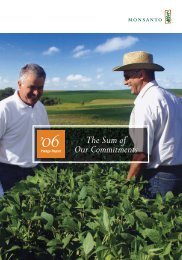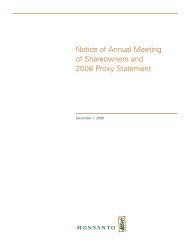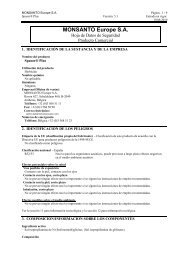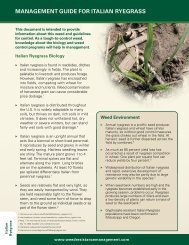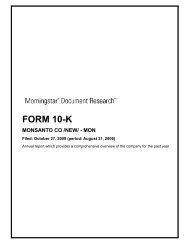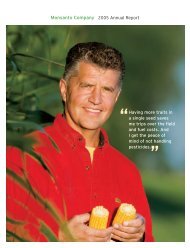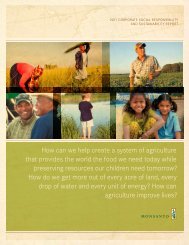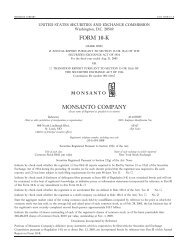You also want an ePaper? Increase the reach of your titles
YUMPU automatically turns print PDFs into web optimized ePapers that Google loves.
GLOBAL CHALLENGE #3: FOOD FOR THE HEART<br />
THE ISSUE<br />
According to the National Institutes of Health, more than 12.5 million Americans have<br />
coronary heart disease and more than 500,000 people die each year from it, making it one of the leading<br />
causes of death in the U.S. Better nutrition can help reduce saturated fats, trans fats and dietary cholesterol,<br />
which can all contribute to coronary heart disease.<br />
Trans-fat is an unsaturated fat that occurs naturally in low levels in milk and beef. However,<br />
80 percent of the trans-fat Americans consume is from partially hydrogenated vegetable oil. 15<br />
Until around 1990, trans-fat was considered as innocuous as other unsaturated fats (such<br />
as those in olive oil.) Then studies demonstrated that trans-fat, like saturated fat, increases the “bad” (LDL)<br />
cholesterol in our blood. One study, published in 2001 by Nicole M. de Roos, a Ph.D. fellow at Wageningen<br />
University in the Netherlands, found that trans-fats — common in margarine, packaged baked goods and<br />
restaurant fried foods — reduced human blood vessel function by a third and lowered “good” (HDL)<br />
cholesterol by a fifth compared to saturated fats. 16 That provided solid evidence that trans-fat increases<br />
the risk of heart disease and is even more harmful than saturated fat.<br />
These findings have led the United States government to require food manufacturers to<br />
disclose the amount of trans-fat on food labels by 2006. Consumer advocates such as the Center for Science<br />
in the Public Interest (CSPI) have petitioned the government to prohibit the use of partially hydrogenated oil<br />
as a food ingredient and launched a grassroots campaign called TransFreeAmerica (www.transfreeamerica.org). 15<br />
The American Heart Association (AHA) now recommends that consumers use unhydrogenated oil such as<br />
canola or olive oil when possible, and to look for processed foods made with unhydrogenated oil rather than<br />
hydrogenated oil or saturated fat.<br />
THE ROLE OF AGRICULTURE<br />
Today’s consumers have become the key driving<br />
force in determining which foods farmers produce, how those foods<br />
are produced and what level of health and nutrition are achieved<br />
from those foods. The demand for healthier foods has caused food<br />
companies to work with suppliers to source agricultural products with<br />
more favorable nutritional profiles — such as unhydrogenated oils.<br />
With soy oil accounting for 65 percent of edible vegetable oil used<br />
in the U.S. and 33 percent worldwide, the race is on to create oils<br />
that remain stable for long periods of time without requiring hydrogenation.<br />
Some food companies are reformulating their products or<br />
adding trans-fat free versions to their product lines.<br />
MONSANTO’S CONTRIBUTION<br />
THE U.S. GOVERNMENT<br />
WILL REQUIRE TRANS-FAT<br />
LABELING BY 2006.<br />
Agriculture companies like <strong>Monsanto</strong> are helping lead the way toward heart-healthy foods by<br />
developing new vegetable oils that don’t need to be hydrogenated and with higher monounsaturated fat and<br />
lower saturated fat content. The process of hydrogenation reduces the amount of linolenic acid in soy oil and<br />
creates trans-fatty acids. <strong>Monsanto</strong> researchers are applying conventional breeding and biotechnology techniques<br />
to develop soybeans that will produce oil that doesn’t need to be hydrogenated to be functional in many foods.<br />
{ MONSANTO COMPANY 2004 PLEDGE REPORT: PAGES 14-15 }



